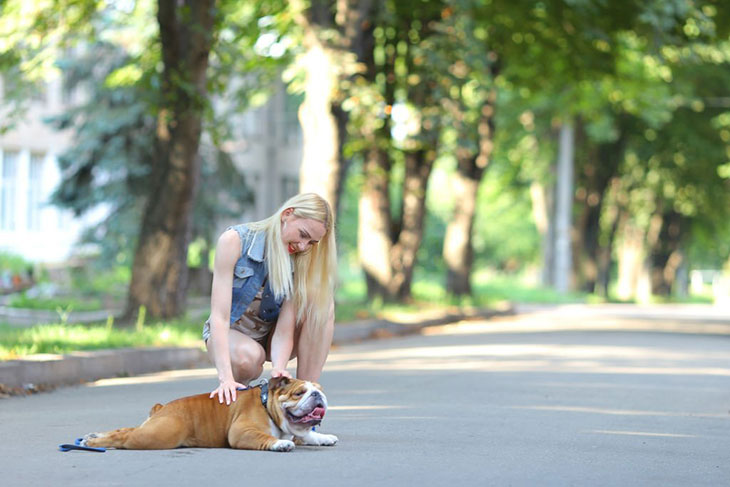As a pet owner, seeing your beloved dog having trouble walking and not eating is distressing.
When your furry companion displays such symptoms, it can indicate an underlying health issue requiring prompt attention and care.
Comprehending the potential causes and knowing how to support your dog during these challenging times is crucial to its well-being and recovery.
Why Is Your Dog Having Trouble Walking And Not Eating?

Why is my dog not getting up?
The dog is experiencing trouble walking and showing a lack of interest in eating, which could be caused by various factors such as stomach upset, pain, anxiety, dental issues, exposure to toxins, severe disease, emotional disturbances, etc.
Your Dog Simply Does Not Want To Eat
When your dog won’t eat or drink and just lays around, it can be concerning and indicate various underlying issues.
One common reason for a dog’s loss of appetite is that they do not want to eat at that moment.
Like humans, dogs’ appetites can fluctuate, and sometimes they may skip a meal or two without any serious cause for concern.
The Dog Has Stomachache
When an adult dog experiences an upset stomach, it can result in reduced hunger levels and difficulty walking.
Stomach pain in dogs has various causes, so observing any additional symptoms is essential.
Common reasons include gastrointestinal upset due to dietary changes, gastritis from infections or dietary indiscretion, and gastroenteritis caused by viral or bacterial infections.
Other clinical signs like dietary sensitivities, pancreatitis, intestinal parasites, foreign object ingestion, and toxic ingestion may also lead to stomach discomfort.
Too Many Dog Treats
Giving your dog excessive goodies can cause several health problems, including the dog can’t stand and won’t eat.
Treats shouldn’t make up much of a dog’s diet; they should only be offered occasionally as rewards.
Overindulging in goodies can lead to many signs of pain, digestive issues, obesity, and other severe medical conditions, making it difficult for them to move comfortably and reducing their appetite stimulants.
The Dog Dislikes Their Food
If your puppy is experiencing difficulty walking and showing a lack of interest in eating, it could be due to their dislike of their current food.
Dogs, like us, have food preferences and may refuse to eat if they find the taste or texture unappealing.
Some breeds may be picky eaters, while others may develop aversions or allergic reactions to certain food items over time.
Feeling Slightly Unwell
Dogs can experience minor illnesses or discomfort like humans and may show a reduced interest in food and decreased mobility issues.
Dogs feel slightly unwell for various reasons, including mild infections, gastrointestinal upset, or general discomfort.
In such cases, it’s essential to monitor your dog’s condition closely and provide them with a quiet and comfortable space to rest.
Ensuring they have access to clean water is crucial to prevent dehydration.
The Dog Is In Pain
Signs of abdominal pain in dogs may include limping, reluctance to move, decreased appetite, restlessness, whining, or changes in behavior.
It’s essential to pay attention to any signs of distress or pain your dog may display.
New Environment

If your dog won’t get up or eat, another possible reason could be related to their environment.
Canines can be extremely sensitive to changes in their surroundings, and transitioning to a new environment can sometimes cause stress or anxiety.
Moving to a new home, going on a trip, or experiencing a change in their daily routine can be unsettling for some dogs.
This may result in behavioral changes, including difficulty walking and losing appetite.
Anxiety
Anxiety in animals can be triggered by various factors, such as loud noises (thunderstorms or fireworks), separation from their owner, meeting new people or animals, or being in unfamiliar environments.
When anxious, dogs may exhibit pacing, restlessness, panting, trembling, hiding, or excessive grooming.
Possible Medication Side Effect(s)
Some medications, especially when newly prescribed or at higher doses, can lead to various side effects in puppies, including appetite, coordination, and mobility changes.
Certain medications can cause drowsiness, lethargy, gastrointestinal disturbances, kidney disease, decreased appetite, and reluctance to move.
Recent Vaccinations
Recent vaccinations can sometimes cause mild side effects in dogs.
After receiving vaccines, some dogs may experience temporary discomfort, lethargy, or soreness at the injection site.
These side effects are generally short-lived, but you must consult your veterinarian if they persist or worsen.
Regular Schedule Changes
Dogs thrive on routine, and disruptions to their regular schedule can lead to discomfort and unease.
During such times, your dog may exhibit anxiety, restlessness, or decreased interest in food.
Your Dog Has a Toothache
Dental issues can significantly cause discomfort for dogs, leading to oral pain, trouble walking, and a reduced appetite.
A toothache can make it painful for your dog to chew or eat, causing them to avoid food altogether or eat less than usual.
Signs of a toothache in dogs may include pawing at the mouth, drooling excessively, bad breath, or avoiding certain types of food.
Intimidation By Another Pet
My dog may experience fear, worry, and anxiety due to intimidation or violence from other animals, resulting in a lack of appetite and unwillingness to move around freely.
Your dog may exhibit submissive behavior, crouch, avoid locations when the other pet is present, or show other signs of intimidation or bullying.
Occasionally, this can turn physical, leading to wounds that might impair your dog’s mobility.
Broken Regular Habits
Puppies are creatures of habit, and unexpected changes, such as changes in meal times, exercise routines, or sleeping arrangements, can cause stress and unease.
When dogs experience disruptions in their regular habits, they may become disoriented, anxious, or withdrawn, leading to changes in their eating and walking behaviors.
Additionally, dogs may show signs of restlessness or vocalization when their regular patterns are altered.
Your Dog Is Grieving
Losing a beloved family member or companion animal can deeply affect dogs, leading to behavioral changes, including a decreased appetite and reluctance to move.
Signs of grieving in dogs may include lethargy, withdrawal, changes in sleep patterns, and loss of interest in food and activities they once enjoyed.
Dogs may also seek out places or belongings associated with the departed individual or pet.
Depression
Just like humans, dogs can experience depression, manifesting as trouble walking and loss of appetite.
Depressed dogs may appear sad, lazy, and disinterested in activities they usually enjoy. They may also sleep more than usual and show signs of apathy or withdrawal.
Impending Change
Dogs are highly wise animals and can sense impending changes in their environment or daily routines.
Anticipating change can cause stress and anxiety in dogs, leading to trouble walking and a reduced appetite.
Exposure to Toxins
Exposure to certain toxins or poisonous substances can lead to adverse health effects in dogs, including trouble walking and gastrointestinal issues.
Common household items and plants, such as chocolate, xylitol, grapes, certain household cleaners, and some houseplants, can be toxic to dogs if ingested.
Intestinal Blockage
An intestinal blockage occurs when a foreign object becomes lodged in your dog’s digestive tract, preventing the normal passage of food and leading to trouble walking and reduced appetite.
Dogs are notorious for ingesting objects they shouldn’t, such as toys, bones, or clothing items.
Small objects can pose a significant risk if swallowed, as they may cause obstructions in the stomach or intestines.
Severe Disease Or Illness

Sometimes, trouble walking and losing appetite may indicate a severe underlying disease or illness.
Various medical conditions, such as neurological disorders, organ failure, and certain infections, can affect a dog’s mobility and appetite.
Conclusion
A dog having trouble walking and not eating requires supportive care and professional assessment to address the underlying cause.
You can assist your animal friend in getting better and ensuring their well-being and happiness by being aware of the causes that might be causing these medical issues and giving them the emergency care they require.
